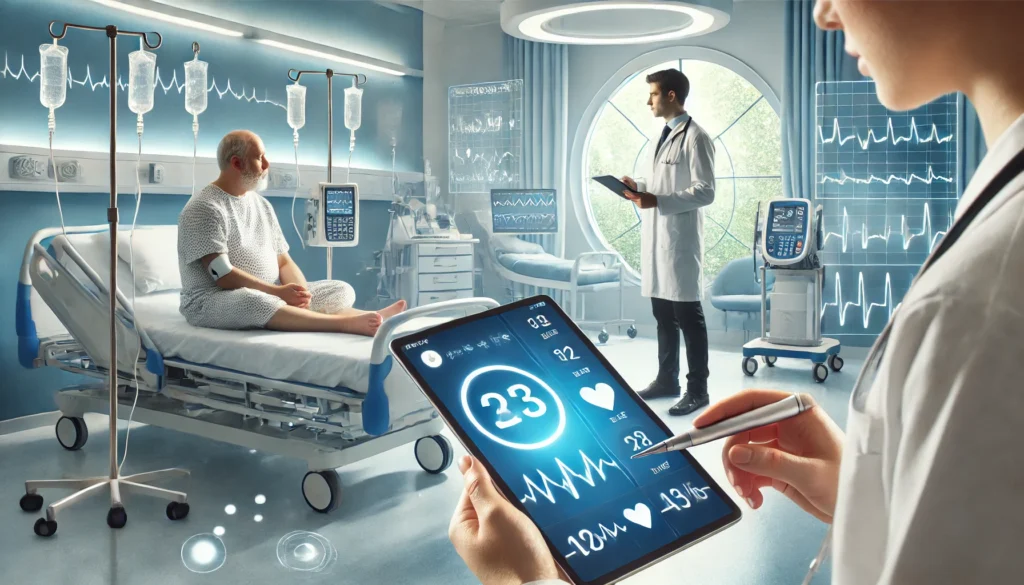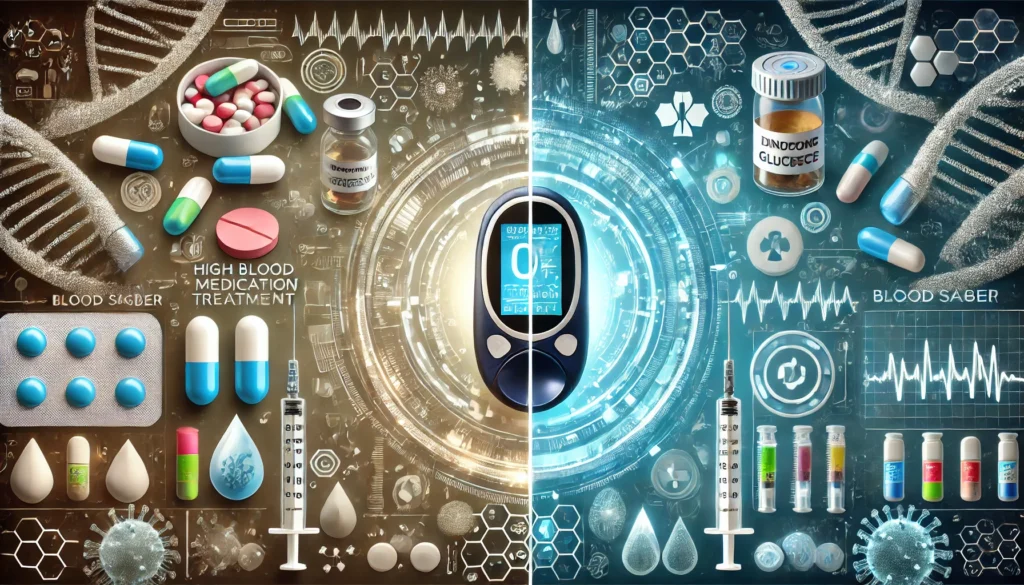The management of high blood sugar levels, commonly associated with diabetes, has seen remarkable advances in recent years. With an increasing prevalence of diabetes worldwide, scientists and medical researchers have focused on developing new treatment options that go beyond traditional insulin therapy and oral medications. Innovations in medicine for high blood sugar levels are now providing more effective, safer, and personalized treatment approaches for individuals seeking better glucose control. This article explores the latest breakthroughs in medication for high blood sugar levels, offering insight into how new therapies are shaping the future of diabetes management.
You may also like: How Diabetes Affects the Brain: Understanding Brain Fog, Memory Loss, and Mental Confusion from High Blood Sugar
Understanding High Blood Sugar and Its Health Implications
High blood sugar, or hyperglycemia, occurs when the body cannot effectively use insulin or produce enough of it to regulate glucose levels. This condition is commonly associated with diabetes, particularly type 1 and type 2, but can also occur due to stress, illness, or certain medications. Chronic hyperglycemia can lead to serious health complications, including cardiovascular disease, kidney damage, neuropathy, and vision impairment. The need for advanced medical interventions has driven extensive research into medications that offer better blood sugar control with fewer side effects.
For years, standard treatment options included insulin therapy and a range of oral medications such as metformin, sulfonylureas, and thiazolidinediones. However, these traditional options often come with challenges, including weight gain, gastrointestinal discomfort, and the risk of hypoglycemia. The growing demand for improved therapies has prompted researchers to explore novel drug classes and personalized treatment plans tailored to an individual’s metabolic profile.

The Rise of GLP-1 Receptor Agonists
One of the most promising advancements in treating high blood sugar levels is the development of GLP-1 receptor agonists. These medications, including semaglutide and liraglutide, mimic the action of glucagon-like peptide-1 (GLP-1), a hormone that stimulates insulin secretion in response to food intake. Unlike traditional insulin therapy, GLP-1 receptor agonists help regulate blood sugar levels while also promoting weight loss, making them an attractive option for individuals with type 2 diabetes.
Research has shown that GLP-1 receptor agonists not only lower blood sugar levels but also provide cardiovascular benefits. Studies indicate that these medications reduce the risk of major cardiovascular events such as heart attacks and strokes in individuals with diabetes. This dual benefit has led to increased use among patients who require both glucose control and cardiovascular protection. Moreover, newer formulations of these drugs, including weekly injectable versions, offer greater convenience compared to daily insulin injections.
SGLT2 Inhibitors: A New Frontier in Diabetes Treatment
Sodium-glucose co-transporter 2 (SGLT2) inhibitors have emerged as a revolutionary class of medicine for high blood sugar. These drugs, including empagliflozin, dapagliflozin, and canagliflozin, work by preventing glucose reabsorption in the kidneys, thereby increasing glucose excretion through urine. This mechanism not only lowers blood sugar levels but also helps reduce body weight and blood pressure, offering additional metabolic benefits.
Clinical trials have demonstrated that SGLT2 inhibitors significantly reduce the risk of heart failure and chronic kidney disease in people with diabetes. Unlike older diabetes medications, which primarily focus on glucose metabolism, SGLT2 inhibitors provide a holistic approach by targeting multiple health factors simultaneously. As a result, these drugs are increasingly prescribed to patients who need comprehensive diabetes management beyond blood sugar control.
Advances in Insulin Therapy
Despite the development of newer drug classes, insulin remains a cornerstone in diabetes treatment. However, recent advancements have improved insulin formulations, making them more efficient and convenient for users. Ultra-long-acting insulins, such as insulin degludec, provide stable blood sugar control with fewer fluctuations, reducing the risk of nocturnal hypoglycemia. Additionally, the advent of smart insulin pens and continuous glucose monitoring systems has enhanced insulin delivery precision, helping individuals achieve better glycemic control with fewer complications.
One of the most exciting breakthroughs in insulin therapy is the development of glucose-responsive insulin. Researchers are working on formulations that automatically adjust insulin release based on blood sugar levels, mimicking the body’s natural insulin response. These innovations have the potential to revolutionize diabetes management by minimizing the risk of both hyperglycemia and hypoglycemia while simplifying treatment regimens.
Emerging Therapies and Future Directions
Beyond GLP-1 receptor agonists, SGLT2 inhibitors, and advanced insulin formulations, new investigational drugs are being explored to further improve blood sugar control. Dual and triple hormone receptor agonists, such as tirzepatide, show promise in enhancing insulin secretion, reducing appetite, and improving metabolic health. These next-generation medications leverage multiple hormonal pathways to achieve superior glucose regulation compared to current therapies.
Additionally, gene therapy and stem cell research are gaining traction as potential long-term solutions for diabetes. Scientists are exploring ways to regenerate insulin-producing beta cells in the pancreas or modify genetic pathways to enhance insulin sensitivity. While these approaches are still in experimental stages, they hold tremendous potential for providing a cure rather than just symptom management for diabetes.
Personalized Medicine for Diabetes Management
With advancements in pharmacogenomics, personalized medicine is becoming a reality for individuals with high blood sugar levels. By analyzing genetic, metabolic, and lifestyle factors, healthcare providers can tailor treatment plans that maximize efficacy and minimize side effects. Personalized approaches enable more precise medication selection, reducing the trial-and-error process often associated with diabetes management.
Artificial intelligence (AI) and machine learning are also playing a role in optimizing diabetes treatment. AI-driven algorithms can analyze real-time glucose data, predict blood sugar fluctuations, and recommend personalized medication adjustments. These innovations enhance treatment outcomes and improve quality of life for individuals managing high blood sugar levels.

Frequently Asked Questions (FAQ): Managing High Blood Sugar Through Medications
1. How do lifestyle choices influence the effectiveness of medicine for high blood sugar levels?
While medications are crucial, their efficacy can vary dramatically depending on a person’s lifestyle. For instance, someone who regularly exercises and maintains a balanced diet may require lower doses of medicine for high blood sugar levels than someone with a sedentary lifestyle. Stress management also plays a key role—chronic stress can elevate cortisol, which interferes with how meds for high blood sugar perform. Moreover, inadequate sleep disrupts glucose metabolism, potentially diminishing the medicine’s intended effects. Personalized routines that align physical activity, nutrition, and rest can enhance how well medicine for high blood sugar integrates into overall care plans.
2. Can meds for high blood sugar impact mental health over the long term?
Yes, both the condition itself and the treatment can influence mental health. Some individuals report mood swings or cognitive fog as side effects of certain meds for high blood sugar, particularly those that cause fluctuations in insulin levels. Additionally, the psychological burden of chronic disease management—constant monitoring, fear of complications, and medication adherence—can contribute to anxiety or depressive symptoms. It’s important to work with providers who understand the emotional side of using medicine for high blood sugar levels, as adjustments to therapy or referrals to behavioral health can be critical for long-term well-being.
3. Are there innovative technologies changing how we use medicine for high blood sugar today?
Absolutely—advancements in digital health are revolutionizing how we manage and monitor high blood sugar. Continuous glucose monitoring (CGM) systems now integrate with smartphone apps, enabling real-time feedback and adaptive dosing for those on certain meds for high blood sugar. Additionally, smart insulin pens and AI-driven platforms help optimize timing and dosage of medicine for high blood sugar levels based on personalized trends. These tools not only improve efficacy but also reduce the cognitive load on patients who manage complex treatment routines.
4. How do different meds for high blood sugar interact with each other, and what are the risks?
Combination therapy is common but comes with considerations. For instance, pairing metformin with sulfonylureas or GLP-1 receptor agonists may increase the risk of hypoglycemia or gastrointestinal issues. Certain combinations of medicine for high blood sugar levels may also interfere with kidney or liver function, especially in older adults. Pharmacogenomics—a field that studies how genes affect drug response—is emerging as a powerful tool to tailor which meds for high blood sugar are safest and most effective for individual patients. Always discuss potential interactions with a healthcare provider before making changes.
5. What are the long-term metabolic effects of relying on medicine for high blood sugar?
Over time, some medications may contribute to secondary complications if not balanced with other health strategies. For example, long-term use of insulin or insulin secretagogues can lead to weight gain, which in turn may worsen insulin resistance. Other meds for high blood sugar might impact lipid metabolism or cardiovascular health. However, newer classes of medicine for high blood sugar levels, such as SGLT2 inhibitors, offer additional benefits like improved kidney function or reduced heart failure risk. Monitoring beyond blood glucose—such as lipid profiles and inflammation markers—is crucial when taking these medications chronically.
6. How does age affect the selection and dosing of medicine for high blood sugar?
Age significantly influences both the pharmacokinetics and pharmacodynamics of medications. In older adults, slower metabolism and decreased renal function can alter how meds for high blood sugar are processed, increasing the risk of side effects like hypoglycemia. Pediatric and adolescent patients, on the other hand, may need tailored approaches due to hormonal changes and activity levels. Clinicians often prefer gentler or shorter-acting medicine for high blood sugar in vulnerable populations, adjusting dosages based on factors like weight, organ function, and lifestyle habits rather than age alone.
7. Can alternative or complementary therapies work alongside medicine for high blood sugar levels?
While no alternative therapy should replace prescribed medications, certain complementary approaches can support better outcomes. Acupuncture, mindfulness meditation, and dietary supplements like cinnamon or berberine have shown modest benefits in blood sugar regulation when used with meds for high blood sugar. However, these methods should always be discussed with a healthcare provider to ensure they don’t interfere with the metabolism or efficacy of conventional medicine for high blood sugar. Integrative medicine clinics often take a holistic view, combining Western pharmacology with Eastern practices for more personalized care.
8. How do environmental and socioeconomic factors influence access to medicine for high blood sugar levels?
Access to quality care, insurance coverage, and geographic location heavily influence which meds for high blood sugar are available to a person. In low-income or rural areas, people may only have access to older, less effective medicine for high blood sugar, increasing the risk of complications. Some patients may also ration doses due to cost, leading to inconsistent control. Efforts like sliding-scale clinics, government assistance programs, and community health outreach can bridge these gaps, ensuring equitable access to life-saving therapies.
9. What are the signs that your current medicine for high blood sugar is no longer effective?
Common red flags include persistent fatigue, blurred vision, frequent urination, or rising A1C levels despite adherence to prescribed meds for high blood sugar. Over time, the body may develop resistance or the underlying disease may progress, requiring a reevaluation of the treatment regimen. If multiple adjustments to diet and lifestyle still fail to stabilize glucose, it may be time to explore newer or combination therapies. Communication with a healthcare provider is key to interpreting these symptoms and adjusting medicine for high blood sugar levels accordingly.
10. What breakthroughs are expected in future treatments for high blood sugar?
Ongoing research is paving the way for more targeted, patient-specific therapies. Scientists are exploring gene editing techniques like CRISPR to modify insulin response at the cellular level. Meanwhile, newer meds for high blood sugar are being developed that target gut hormones, beta-cell regeneration, and even the microbiome. Personalized medicine—tailoring treatments based on an individual’s genetic and metabolic profile—is gaining traction and could dramatically change how we approach the prescription of medicine for high blood sugar levels. These innovations offer hope for not only better glucose control but also disease reversal in the future.

Conclusion: The Future of Medicine for High Blood Sugar Levels
The landscape of medicine for high blood sugar is rapidly evolving, with groundbreaking research paving the way for more effective, safer, and patient-centered treatments. From GLP-1 receptor agonists and SGLT2 inhibitors to advanced insulin formulations and emerging therapies, the future of diabetes management looks promising. The integration of personalized medicine, AI-driven treatment strategies, and potential curative approaches such as gene therapy will continue to transform the way high blood sugar levels are treated.
For individuals living with diabetes, these advancements offer hope for improved health outcomes, greater convenience, and better overall well-being. As scientific research progresses, healthcare professionals and patients alike can look forward to a future where managing high blood sugar levels is not only more effective but also tailored to individual needs. The continued collaboration between medical researchers, clinicians, and technology developers will be key in ensuring that these innovations reach those who need them most, ultimately improving the quality of life for millions worldwide.
advanced diabetes treatments, blood sugar management breakthroughs, diabetes medication innovations, new glucose-lowering drugs, future of diabetes treatment, emerging diabetes therapies, insulin therapy advancements, GLP-1 receptor agonists, SGLT2 inhibitors benefits, personalized diabetes medicine, smart insulin technology, AI in diabetes care, glucose monitoring advancements, cardiometabolic health and diabetes, genetic research in diabetes, beta cell regeneration, diabetes drug development, pharmaceutical research for diabetes, diabetes and cardiovascular health
Further Reading:
Disclaimer: The content published on Better Nutrition News (https://betternutritionnews.com) is for informational and educational purposes only. It is not intended as a substitute for professional medical advice, diagnosis, or treatment. Always seek the guidance of a qualified healthcare professional before making any changes to your diet, nutrition, or wellness practices. The opinions expressed by authors and contributors are their own and do not necessarily reflect those of Better Nutrition News.
Better Nutrition News and its affiliates make no representations or warranties regarding the accuracy, completeness, or reliability of the information provided. We disclaim all liability for any loss, injury, or damage resulting from the use or reliance on the content published on this site. External links are provided for reference purposes only and do not imply endorsement.



